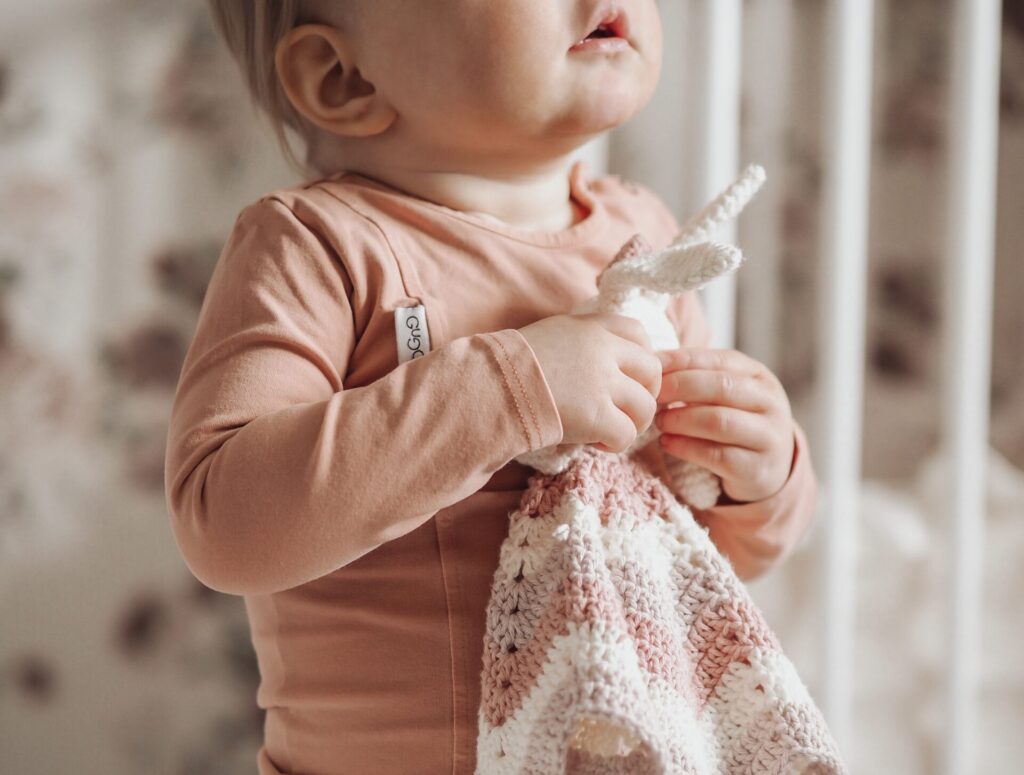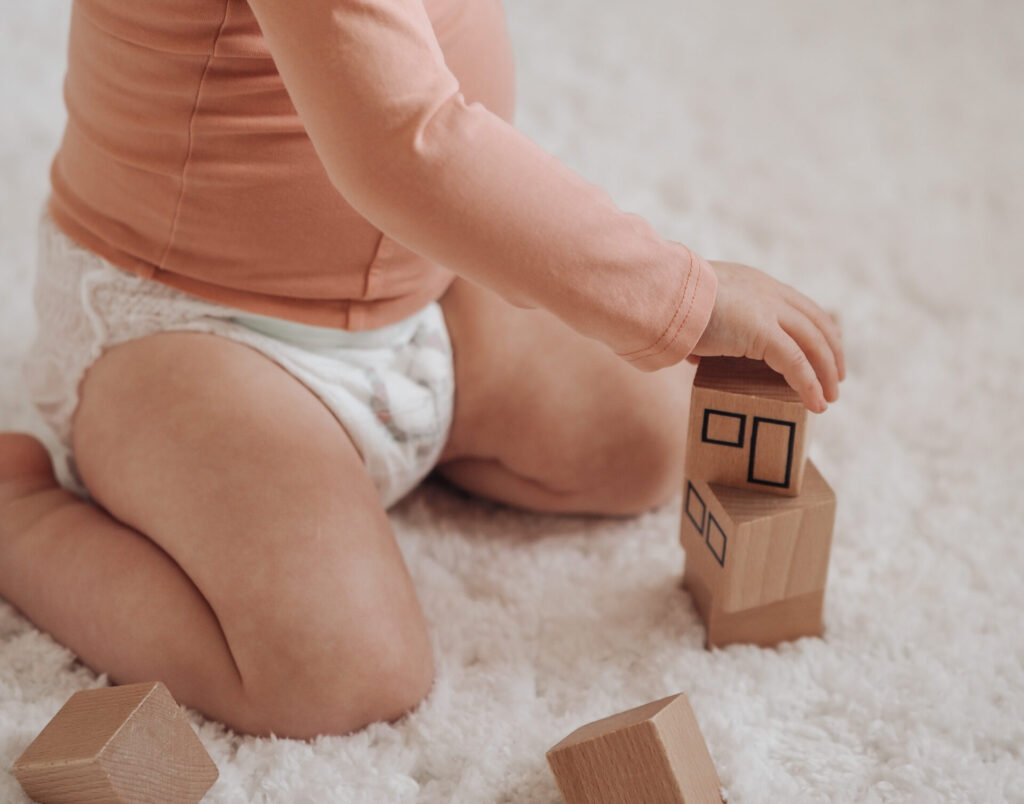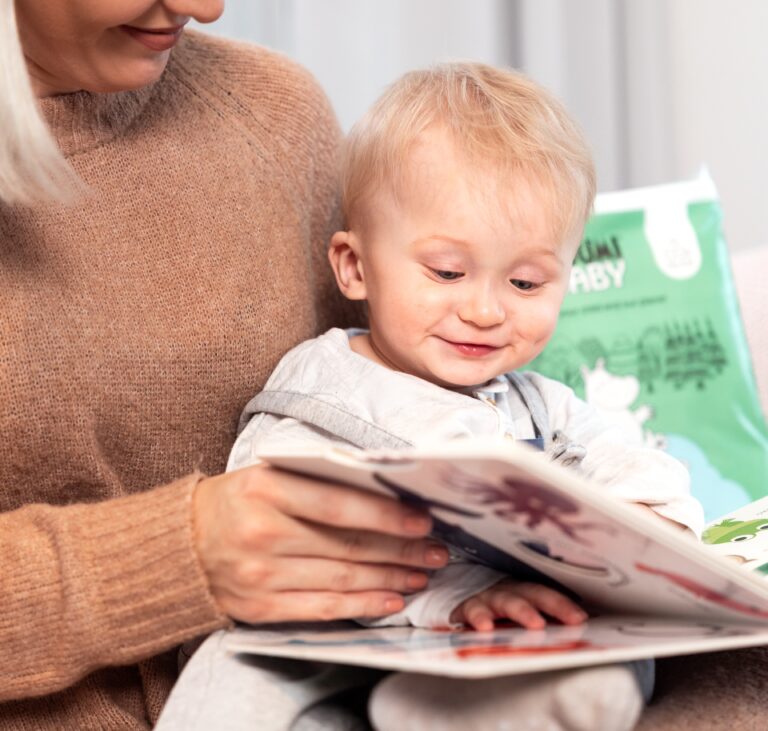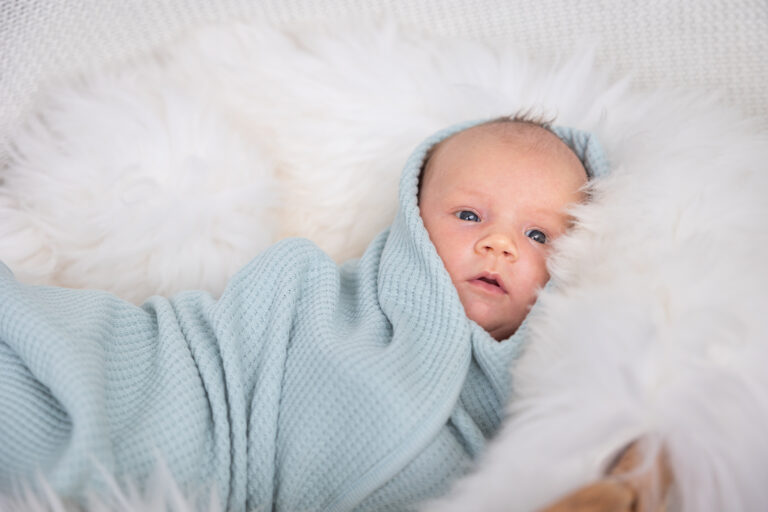Playtime with your baby can be rewarding for both the baby and the parent. This article provides information on the importance of playtime for baby’s development and gives concrete tips on how to implement different types of games and activities. With these tips, you can support your child’s growth and create wonderful memories.
Why is playing vital for your baby’s development?
Playing is in many ways a key factor in a baby’s development. Firstly, it provides the baby with the opportunity to explore the world around them in a safe and supportive environment. Research shows that babies learn best when they are free to experiment, touch, taste and see new things. Playing stimulates the senses and brain development, which is particularly important in the first months of life. Playing also gives babies the opportunity to practise their motor skills, such as grasping, rolling and crawling, which strengthens muscles and coordination.
In addition to physical development, playing also promotes cognitive and social learning. Interaction with a parent or other playmate teaches babies important skills such as communication and empathy. For example, a simple game of hide-and-seek helps a child to understand permanence – that objects and people exist even if they are not always visible.
Playtime not only benefits the baby; it also strengthens the bond between parent and child. Playing together builds mutual trust and affection, which lays the foundation for healthy emotional development. Playing is therefore a comprehensive and vital part of a baby’s growth and learning, bringing joy and an overall positive impact on the baby’s life.
The role of the parent as playmate: Building trust and attachment
The role of the parent as the baby’s playmate is invaluable as it provides an opportunity to build a strong foundation of trust and attachment. By participating in the baby’s playing, the parent not only watches from the sidelines, but actively encourages, guides and enjoys along with the baby. This interaction promotes the baby’s emotional development and gives them a sense of being loved and valued.
Playtime is also an ideal way to learn to understand your baby’s needs and preferences. When parents discover which games or activities make their baby’s eyes light up, they can use this knowledge to build more meaningful moments. Playing together allows for open interaction where the baby can express themselves while developing social skills such as taking turns and sharing attention.
The role of a parent is not only to teach, but also to comfort and encourage. When your baby faces challenges during playtime, a parent’s presence and words of encouragement help your baby build confidence and tolerate smaller adversities. In this way, your baby learns that they have a safety pillar of support they can always rely on.
Shared playtimes create unique memories and strengthen the bond between the parent and the baby in a way that will bear fruit long into the future. They become moments of joy and learning that support all stages of the baby’s development while deepening the relationship with the parent.
Read about the importance of skin-to-skin contact for your baby here!
All these forms of sensory stimulation help your baby to develop a deeper understanding of their environment and at the same time contribute to brain growth and development.
Stimulating the senses: Opening up your baby’s world
Stimulating the senses is a key part of a baby’s development, helping them to understand and articulate the world around them. Babies are born ready to explore their environment with all their senses – sight, hearing, touch, taste and smell. Playtime that focuses on the senses can provide babies with rich and varied learning experiences.
To develop the sense of sight, parents can use toys and objects with colourful or contrasting colours. Black and white patterns and bright colours encourage babies to look and follow movement, which strengthens vision and eye coordination. The auditory sense can be stimulated by different sounds, such as musical instruments, singing and environmental sounds. Rhythmic songs and chants help your baby to recognise and remember different sound patterns.
Different textures can be used to support the sense of touch, such as soft fabrics, rubber toys or rough objects. Your baby will learn to distinguish and recognise different textures and temperatures. Tasting games can also provide new experiences; small amounts of safe, mild-tasting foods can add variety to your baby’s palate. However, it is worth recognising when it is possible to expand their feeding habits. Smells can be explored, for example through flowers or mild spices, which bring new dimensions to your baby’s sensory world.
All these forms of sensory stimulation help your baby to develop a deeper understanding of their environment and at the same time contribute to brain growth and development. The varied use of the senses in playtime makes it not only educational, but also enjoyable and enriching for both the baby and the parent.
Developing motor skills: First steps towards an active life
The development of motor skills is one of the most important stages in a baby’s life, and playing provides an excellent opportunity to practice and strengthen these skills. During the first few months, babies learn to control their bodies and make appropriate movements. Playtime can play an important role in this development.
At first, babies need a lot of floor time to practise being on their tummies, known as tummy time. This helps to strengthen the muscles of the baby’s neck, shoulders and back, which are important for subsequent developmental stages such as crawling, sitting and eventually walking. Parents can make tummy time more attractive by placing colourful toys or mirrors in front of the baby to encourage them to lift their heads and look around.
When the baby starts to crawl, placing toys slightly out of their reach will motivate them to move and at the same time strengthen their whole body coordination. The hands and feet work together to develop both coarse motor skills, such as the control of large muscle groups, and fine motor skills, which involve making smaller, more precise movements.
Toys that require grasping, swinging or stacking promote hand and finger development. Soft balls, chew toys and building blocks, for example, offer plenty of opportunities to develop strength and accuracy. Simple ‘catch and hold’ games or block towers done together are excellent practice for developing baby’s motor skills, while providing an opportunity for a shared moment of joy with a parent.
As motor skills develop, play sessions become increasingly varied and interactive, which not only strengthens body control but also increases confidence and readiness for future physical challenges. Step by step through playing, your baby moves towards a more physical and independent life.
Find out about the importance of crawling in motor development here!
Communication skills: The basis for social skills
Communication skills start to develop from birth and playing offers babies a wide range of opportunities to practise these important skills. During the first few months, baby’s communication is very basic: smiles, eye contact and babbling. The parent’s active involvement in these early interactions lays the foundation for future social development.
Shared playtimes, such as hide and seek or peek-a-boo games, are excellent ways to teach turn-taking and waiting. In these games, the baby learns that even if something disappears from view for a moment, it can reappear. This supports the understanding of permanence, which is an essential part of social cognition development.
Musical games and songs that alternate rhythms and melodies can help your baby to recognise emotional expressions associated with sounds and develop listening skills. For example, songs related to the baby’s names and daily activities reinforce the baby’s sense of self and environment, while creating a stronger bond between the baby and the parent.
Interaction skills are not limited to one-to-one play with a parent. As your baby becomes interested in other people and children, shared playtime develops social understanding and teamwork. For example, participating in small groups and playdates with other babies of the same age provide opportunities to learn about sharing, cooperation and hospitality.
All these games and activities build a baby’s ability to understand and respond to the feelings and gestures of others, which is a key component of social and emotional intelligence. In this way, your baby learns that interaction is safe, supportive and joyful, laying a strong foundation for social skills and relationships that will develop in the future.
Find out how reading to your baby can also support their development here!

Stages of your baby’s playing: Ideas and tips for each stage of development
During the first year of a baby’s life, the games and activities change as the baby grows and develops. Each stage of development brings with it new skills and interests, so it’s a good idea to choose toys according to age.
0-3 months:
During the first few months, your baby is particularly interested in faces and sounds. Simple games such as peek-a-boo and happy chatter with soft sounds help to develop interaction skills. Colourful toys with contrasting colours or moving mobiles above the cot stimulate the sense of sight and encourage the baby to follow movement with their eyes.
3-6 months:
After three months, your baby starts to practice body control and motor skills. Floor time tummy time is particularly important at this stage to strengthen the muscles of the neck and back. Rattling and squeaking toys that your baby can grab and shake help develop hand and eye coordination.
6-9 months:
At six months of age, your baby starts to crawl and explore their environment more actively. This is a great time to play crawling games or build small obstacles for your baby to cross or go around. Building blocks and assembling toys provide challenges for hand coordination and problem-solving skills.
9-12 months:
As your baby approaches one year of age, they may begin to take their first steps and otherwise move more independently. Simple ball games, moving toys and pull-along playthings help to develop walking and balance. Naming games, in which the parent points to objects and tells the names, also support language development.
At each stage, games and activities should be safe and appropriately challenging to inspire the baby to learn new things at their own pace. The presence and encouragement of a parent makes playtime enjoyable and safe experiences that support the baby’s overall development.
Learn about your baby’s development during the first year here!
Special moments: Small choices make a big difference
Creating special moments of playtime with your baby does not require much preparation or special equipment. With small choices and simple ideas, you can make playtime a meaningful and joyful experience for both you and your baby. For example, watching your baby’s expressions and sounds can give you clues about which activities they enjoy. They might laugh when they are tickled, or calm down when they hear a familiar song.
Using natural materials such as wood or fabric can bring new sensations to playing. A simple piece of cloth that you run your fingers through can be a source of wonder for your baby. Even everyday objects, such as kitchen utensils, can be exciting to explore – stacking and knocking over jars, for example, is a delight for many babies.
Remember that it is important to be present and available during the play session. Distraction-free moments where you are fully focused on your baby create a special bond and help you to better recognise your baby’s messages and needs. Playtimes that are routine, for example in the morning or evening, can provide a rhythm to the day and create a sense of security.
Finally, small routines and rituals that emerge from special moments strengthen the bond between the baby and the parent and allow both to enjoy time together. Observational and spontaneous playing brings joy and meaning to daily life, while also serving as an important developmental support.
Music plays a huge role in your baby’s development.
Music and play: Moomin Baby playtime playlist
Music plays a huge role in your baby’s development and it can make playtime even more enjoyable and versatile. It also has the ability to influence emotions, stimulate the brain and help with concentration. Babies love music and its rhythms, chords and melodies are a great source of stimulation for them. The Finnish Moomin Baby playlist is designed with these needs in mind, providing inspiring and joyful tunes for your baby’s everyday play time.
Music can be used in many ways; it can create a calm atmosphere before naptime, inspire movement and dancing, or serve as a background for communal singing sessions. Singing and moving together to music improves interaction and brings joy to both. Songs that include simple movements, such as “Head, shoulder, bottom, knees, toes”, can support the development of motor skills and help your baby understand their body.
The Finnish Moomin Baby playlist contains a wide variety of songs, ranging from calm songs to energetic ones, and can therefore be adapted to different play times and moods. You can use the playlist as background music for free play or as part of specific musical games and singing moments, enriching your baby’s sensory world and making playtimes special.
Experiment with the music in the playlist and discover new favourite songs together with your baby to make playtime even more fun and inspiring. With the right music, playdates become memorable and developmental experiences that create warm memories and strengthen the bond between the parent and the baby. Find the Finnish Moomin Baby playlist here.
Support and security: Creating an environment for playing and learning at home
Creating an environment for playing and learning at home is key to ensuring that your baby can explore, learn and grow in a safe and stimulating way. Your baby’s environment should be enriching yet safe, so that they can explore and experiment without constant restrictions or dangers. The first step is to assess the spaces in the home and eliminate potential hazards such as sharp corners, small objects that can end up in the mouth, and safeguarding electrical cords.
It is a good idea to divide the playtime environment into different areas to meet the baby’s different needs. For example, a soft mat or play mat can serve as a tummy-training area, for example for tummy time and crawling, and a corner with colourful toys can encourage exploration and grabbing. Open shelves with safe and easy-to-use toys encourage independent playing and make it easier for your baby to access their favourite toys.
Be sure to include a quiet area with nice books or soft toys so baby can rest and calm down when needed. This could be a soft armchair or a corner with cushions where you can sing together or read stories.
You can add variety and new stimuli such as colourful mobiles, soft balls and building blocks to the environment to support motor skill development and sensory integration. This gives your baby the opportunity to develop in a variety of ways and according to their interests. Parental presence and guidance are certainly essential, but independent exploration and learning are also valuable skills.
A playtime and learning environment that is safe, diverse and easily accessible provides the best conditions for the baby’s development and learning. At the same time, it helps parents enjoy playtime knowing that their baby is in a safe and inspiring environment.
Check out our other tips for building a safe and cosy room here!
Loving moments: How to turn playtime into shared moments
Playtime with your baby not only supports development, but also creates priceless memories and strengthens the bond between the parent and the child. Shared playtime can be a valuable break from everyday life, where you can focus fully on each other and enjoy time together without hurry or distraction.
One way to make playtime special is to make it part of your daily routine. Repeated playtimes in the morning, after naptime or in the evening help to create a sense of familiarity and security. In this way, the baby learns to look forward to these moments of sharing, which are not just occasional, but daily moments of joy and connection.
Interactive games in which the parent and baby interact closely, such as singing, dancing or playing with simple toys, add to the emotional value of playing. For example, simple songs that involve hand movements such as “Head, shoulder, bottom, knees, toes” can bring enormous joy and strengthen bonds.
When playtimes are personal and full of warmth, your baby feels loved and valued. This promotes emotional development and creates a strong basis for trust and affection. Paying attention to small details, such as watching your baby’s excitement and laughter, makes playtimes special and meaningful.
Remember, too, that playing doesn’t have to be complicated or require a lot of equipment – it’s all about being present and sharing your attention. In this way, playtime can bring genuine joy to everyday life and special moments together that enrich the lives of both the baby and the parent.










